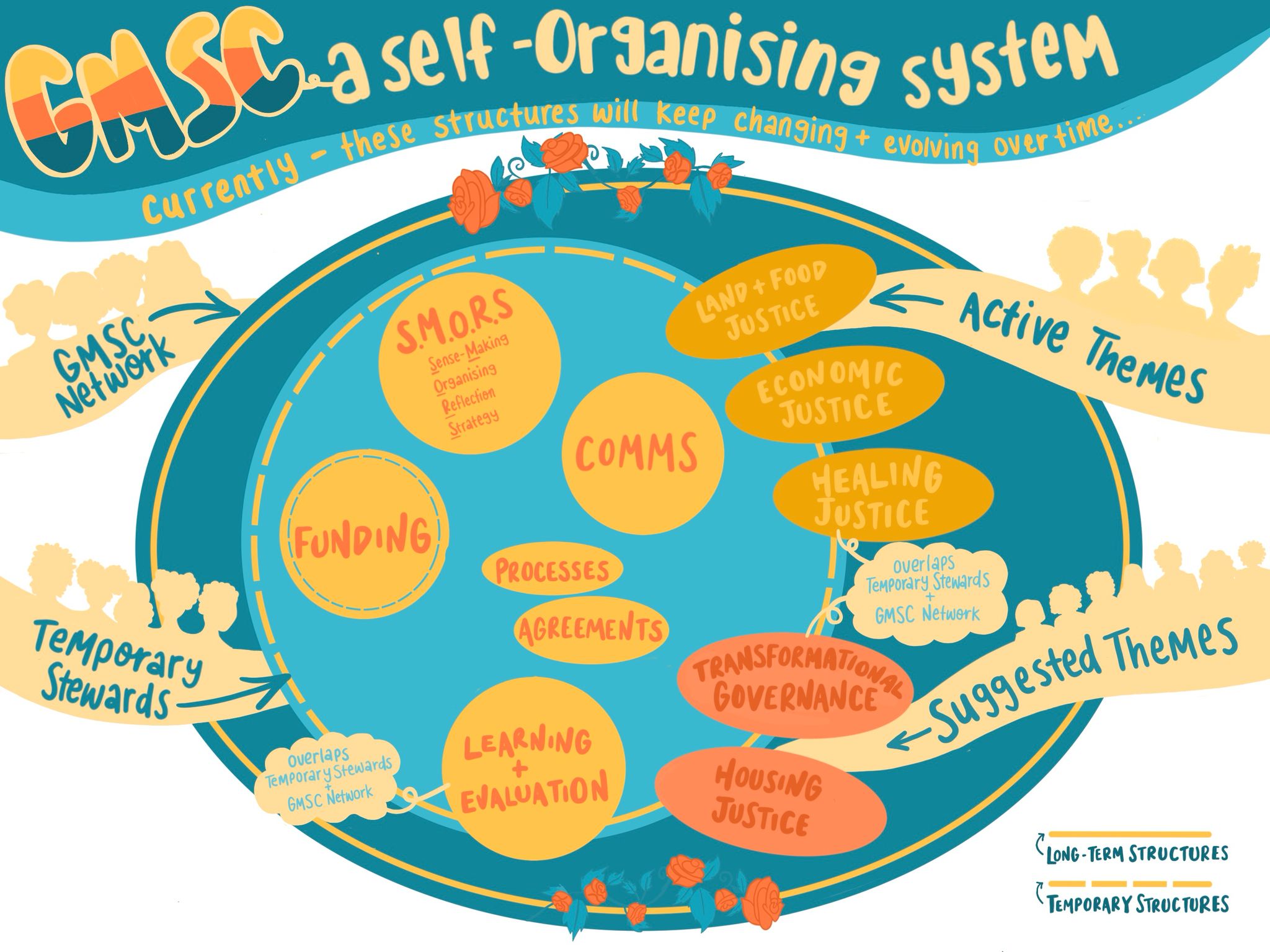
Accountability doesn’t have to be scary. While it will never be entirely easy or comfortable, true accountability pushes us to grow, change, and transform. As Mia Mingus writes in Leaving Evidence, accountability should challenge us, not as a form of punishment, but as a path toward relational and collective growth.
At GM SC, the Temporary Stewards group has been exploring ways to weave accountability into our governance structures. The goal was to move beyond a punitive understanding of accountability and instead, practice it as a way to build a culture of care, relationality, and trust. Inspired by transformative justice, Emergent Strategy, and abolitionist frameworks, we are experimenting with processes that make accountability feel like an invitation rather than a judgment.
Where we are now
The TS group has several accountability mechanisms in place, but we recognise that accountability should not just exist at the collective level, it should also be practiced in smaller groups and at the individual level. By fostering mutual accountability in small ways, we hope to strengthen our ability to hold each other accountable with grace and commitment to our shared vision.
We acknowledge that many of us have had harmful experiences with accountability in the past: experiences that equated accountability with punishment, power-over dynamics, or judgment. This history makes it understandable that some people fear terms like ‘mutual accountability’. Our approach is to unlearn these harmful associations and reimagine accountability as a practice of care and commitment.
To do this, we are guided by key assumptions:
- Accountability should support a community of care. It should not be about fear or punishment but about fostering an environment where we can all thrive.
- We need a North Star. Accountability only makes sense if we know what we are holding ourselves accountable to. Defining our shared vision and principles is crucial. We hope this will happen during the next Decision-making Forums.
- Roles and tasks must be clear. Without clarity on who is responsible for what, accountability becomes difficult to practice.
- Courageous conversations matter. Creating space for honest dialogue about our roles, intentions, and challenges helps deepen trust and reflection.
- Reflection is key. Journaling and self-reflection can help us notice patterns and grow in our accountability practice.
The next steps: A structured accountability practice
To integrate these principles into our daily work, we are implementing a structured accountability practice:
- Triads for peer accountability
- We will form randomly assigned triads within the TS group, with support available for adjustments if needed.
- Each triad will meet fortnightly for an hour to reflect on guiding questions.
- Guiding questions for reflection
- For the collective: What is working well? Where are we hitting red lines? How are group dynamics shifting?
- For the individual: What do I want to accomplish before the next meeting? What am I struggling to share? Do I still have the capacity for my role?
- For the triad: How can we support each other? What patterns are emerging in our work?
- Encouraging pattern spotting and documentation
- Members are encouraged to journal about their reflections to identify recurring challenges and insights.
- If an issue needs escalation, designated support roles (Gill and Carrina) will be available.
Resources to guide us on this journey
We are also exploring different models to support accountability and repair conversations:
- Mia Mingus’ Four-Part Accountability Tool (Self-reflection, Apologising, Repair, Behaviour change)
- COIN Framework (Context, Observation, Impact, Next steps)
- Transition Resource Circle
- Courageous conversations from the Abolitionist’s Handbook
Reflections on our journey so far
Since the TS group formed in January, we have been navigating what it means to be self-organising and self-governing. As a microcosm of the broader GM SC network, we have been experimenting with governance structures, decision-making processes, and mutual accountability.
We have already implemented key structures, including regular meetings, working groups, co-created agreements, and conflict resolution systems. At the network level, more sustained communication is happening, and we continue inviting partners into decision-making spaces. However, there is still work to do, particularly in defining our shared vision and mission.
A few challenges remain:
- Clarifying our guiding principles. Earlier in the process, we could have explicitly named principles like power-sharing and multiple perspectives to guide our work.
- Defining our vision and mission. What are we holding ourselves accountable to if we don’t have a clear collective vision?
- Building trust across the group. Trust is not a given, it must be nurtured through intentional relationship-building and care-based accountability practices.
Despite the challenges, this group has achieved so much in a short time. In a world marked by systemic oppression, scarcity, and grief, we have held space for radical experimentation in governance and accountability. Accountability, when practiced with care, is an act of love and commitment to collective liberation. Let’s keep building toward a culture where accountability strengthens, rather than diminishes, our relationships.
